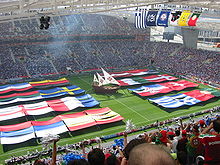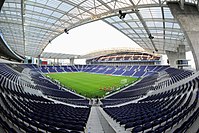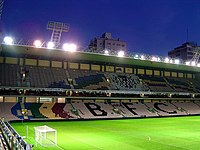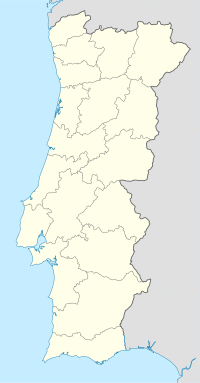
A | B | C | D | E | F | G | H | CH | I | J | K | L | M | N | O | P | Q | R | S | T | U | V | W | X | Y | Z | 0 | 1 | 2 | 3 | 4 | 5 | 6 | 7 | 8 | 9
| Campeonato Europeu de Futebol 2004 (in Portuguese) | |
|---|---|
 Vive O 2004! | |
| Tournament details | |
| Host country | Portugal |
| Dates | 12 June – 4 July |
| Teams | 16 |
| Venue(s) | 10 (in 8 host cities) |
| Final positions | |
| Champions | |
| Runners-up | |
| Tournament statistics | |
| Matches played | 31 |
| Goals scored | 77 (2.48 per match) |
| Attendance | 1,160,802 (37,445 per match) |
| Top scorer(s) | |
| Best player(s) | |
The 2004 UEFA European Football Championship, commonly referred to as Euro 2004, was the 12th edition of the UEFA European Championship, a quadrennial football competition contested by the men's national teams of UEFA member associations. The final tournament was hosted for the first time in Portugal, from 12 June to 4 July 2004.[1][2] A total of 31 matches were played in ten venues across eight cities – Aveiro, Braga, Coimbra, Guimarães, Faro/Loulé, Leiria, Lisbon, and Porto.
As in 1996 and 2000, the final tournament was contested by 16 teams: the hosts plus the 15 teams that came through the qualifying tournament, which began in September 2002. Latvia secured their first participation in a major tournament after overcoming Turkey in the play-offs, while Greece returned to the European Championship after 24 years.
The tournament was rich in surprises and upsets: Traditional powerhouses Germany, Spain, and Italy were eliminated in the group stage, while defending champions France were knocked out in the quarter-finals by Greece. Portugal recovered from an opening defeat against Greece to reach the final, eliminating England and the Netherlands along the way. For the first time in a major European football tournament, the last match featured the same teams as the opening match.[3] Portugal were again defeated by Greece with a goal from Angelos Charisteas.[4] Greece's triumph was unexpected, considering that they had only qualified for two other major tournaments: UEFA Euro 1980, at which they managed just one point, and the 1994 FIFA World Cup, where they lost all three matches. As winners, Greece earned the right to represent Europe at the 2005 FIFA Confederations Cup.
During the opening ceremony, one of the tableaux depicted a ship – symbolising the voyages of the Portuguese explorers – sailing through a sea that transformed into the flags of all competing countries.[5] In the closing ceremony, Portuguese-Canadian singer Nelly Furtado performed her single and official tournament theme song, "Força".
Bid process
Portugal were announced as hosts for UEFA Euro 2004 on 12 October 1999, in Aachen, Germany, beating Spain and the joint bid of Austria and Hungary.[1]
Summary
Group A opened with a shock as Greece, ranked outsiders from start, defeated the hosts 2–1. Giorgos Karagounis put the Greeks ahead after only seven minutes and Angelos Basinas made it 2–0 from the penalty spot on 51 minutes. A stoppage-time goal by Cristiano Ronaldo proved no more than a consolation.[6] Greece then drew with Spain[7] before losing to Russia in their last group stage game.[8] Portugal recovered from their opening defeat by defeating Russia 2–0, who had their keeper Sergei Ovchinnikov sent off.[9] Nuno Gomes scored the winning goal against Spain,[10] which ensured Portugal finished top of Group A. Greece advanced to the quarter-finals as runners-up, ahead of Spain on goals scored.[11]

Defending champions France scored twice in stoppage time to go from 1–0 down to beat England 2–1. Zinedine Zidane scored both goals; the second from the penalty spot.[12] England's other two games were memorable for the performances of their young star Wayne Rooney. Only 18 at the time, Rooney's goal-scoring ability proved instrumental in victories over Switzerland (3–0) and Croatia (4–2).[13][14] France and England qualified from the group as winners and runners-up respectively.[15]
Group C featured a three-way tie between Sweden, Denmark and Italy. All matches between the three sides had ended in draws and all three had beaten Bulgaria.[16][17][18] Italy were ultimately eliminated on the number of goals scored after Sweden and Denmark drew 2–2 and qualified as group winners and runners-up.[19][20] The Italians accused Sweden and Denmark of fixing their match,[21] as both sides knew that a 2–2 result would advance them both over Italy, but UEFA dismissed the complaint.[22]
The Czech Republic won Group D as the only team to win all three of their group matches. They defeated Latvia 2–1,[23] the Netherlands 3–2,[24] and Germany 2–1.[25] It was another disappointing European campaign for the Germans, who failed to advance from the group stage for the second consecutive time.[26] The Netherlands claimed a quarter-final berth as runners-up.[27]

In the first quarter-final between England and Portugal, the English opened the score after only two minutes through Michael Owen. Portugal's constant attacking pressure from then on resulted in Hélder Postiga's 83rd-minute equaliser. In the dying minutes, Owen hit the Portuguese crossbar and Sol Campbell headed in the rebound, but the goal was ruled out by referee Urs Meier for a foul on the Portuguese goalkeeper Ricardo. The sides exchanged goals in extra-time, sending the match to a penalty shoot-out. Portugal won 6–5, as Ricardo saved from Darius Vassell and then scored the winning goal himself.[28]
The Greeks, meanwhile, continued to stun everybody. Firm defensive play and an Angelos Charisteas goal on 65 minutes helped Greece defeat France 1–0 and progress to the semi-finals.[29] This victory made Greece the first team to defeat both the hosts and defending champions in the same tournament. Sweden and the Netherlands played out an exciting but goalless encounter, even after a dramatic period of extra-time in which Freddie Ljungberg hit the inside of the Dutch goalpost. The Dutch progressed after winning the penalty shoot-out 5–4, their first victory on penalties in a major tournament.[30] The last quarter-final match saw the Czechs dispatch Denmark, as a two-goal effort from Milan Baroš helped seal a 3–0 win.[31]

Portugal and the Netherlands faced each other in the first semi-final. Cristiano Ronaldo put the hosts in the lead from a corner kick midway through the first half, and just before the hour mark Maniche made it 2–0 with a spectacular goal from the corner of the penalty area. An own goal from Jorge Andrade gave the Netherlands a glimmer of hope. The game ended 2–1 to Portugal and the hosts,[32] after their opening day failure, were through to the final of the European Championship for the first time. The Czech Republic looked likely candidates to face the hosts in the final. They were favourites to take the trophy, having won all four of their games. However, they would have to see off the upstart Greeks to do so. The Czechs had several chances, including a shot from Tomáš Rosický that struck the bar. The game remained goalless until the dying moments of the first half of extra time, when Traianos Dellas headed home the winner, the first and only silver goal in a European Championship.[33]
The final was a repeat of the opening game of the tournament and Portugal were hoping to avenge their defeat. Portugal attacked and dominated possession but once again, sturdy defending and goalkeeping from Greece kept the hosts off the scoreboard. Just before the hour mark, Greece earned a corner kick from which Angelos Charisteas scored. Portugal continued to press after the goal but even with five minutes of stoppage time, they could not find an equaliser. Greece won the match 1–0 and were crowned European champions,[34] a title that they were given a 150–1 chance of winning before the tournament.[35] All of Greece's wins in the knockout stage came in an identical manner: a 1–0 win, with the goal being a header off a cross from the right wing. Portugal became the first host nation to lose in a European Championship final.
Qualification
The draw for the qualifying round was held on 25 January 2002 at the Europarque Congress Centre, in Santa Maria da Feira, Portugal. Fifty teams were divided into ten groups of five and each team played two matches against all its opponents, on a home-and-away basis. Qualification matches took place from September 2002 to November 2003. The first-placed teams from each group qualified automatically to the final tournament, whereas the ten runners-up took part in a two-legged play-off to select the remaining five teams that would join the host nation in the final tournament.[36][37]
Qualified teams
Ten of the sixteen finalists participated in the previous tournament in 2000. Latvia made its first appearance in a major football competition, while Greece returned to the European Championship finals after a 24-year absence. Bulgaria, Croatia, Russia and Switzerland also took part in their second tournament finals since their debut in 1996.
As of 2024, this was the last time that Bulgaria qualified for the European Championship finals and also the last time Bulgaria qualified to a major tournament, the only time that Latvia qualified, as well as the last time that Poland failed to qualify.
| Team | Qualified as | Qualified on | Previous appearances in tournament[A] |
|---|---|---|---|
| Host | 12 October 1999 | 3 (1984, 1996, 2000) | |
| Group 1 winner | 10 September 2003 | 5 (1960, 1984, 1992, 1996, 2000) | |
| Group 3 winner | 10 September 2003 | 5 (1960, 1976, 1980, 1996, 2000) | |
| Group 4 winner | 10 September 2003 | 2 (1992, 2000) | |
| Group 8 winner | 10 September 2003 | 1 (1996) | |
| Group 2 winner | 11 October 2003 | 6 (1964, 1984, 1988, 1992, 1996, 2000) | |
| Group 5 winner | 11 October 2003 | 8 (1972, 1976, 1980, 1984, 1988, 1992, 1996, 2000) | |
| Group 6 winner | 11 October 2003 | 1 (1980) | |
| Group 7 winner | 11 October 2003 | 6 (1968, 1980, 1988, 1992, 1996, 2000) | |
| Group 9 winner | 11 October 2003 | 5 (1968, 1980, 1988, 1996, 2000) | |
| Group 10 winner | 11 October 2003 | 1 (1996) | |
| Play-off winner | 19 November 2003 | 1 (1996) | |
| Play-off winner | 19 November 2003 | 0 (debut) | |
| Play-off winner | 19 November 2003 | 6 (1976, 1980, 1988, 1992, 1996, 2000) | |
| Play-off winner | 19 November 2003 | 6 (1964, 1980, 1984, 1988, 1996, 2000) | |
| Play-off winner | 19 November 2003 | 7 (1960, 1964, 1968, 1972, 1988, 1992, 1996) |
- ^ Bold indicates champion for that year. Italic indicates host for that year.
- ^ From 1960 to 1980, the Czech Republic competed as Czechoslovakia.
- ^ From 1972 to 1988, Germany competed as West Germany.
- ^ From 1960 to 1988, Russia competed as the Soviet Union, and in 1992 as CIS.
Final draw
- The group stage draw took place on 30 November 2003 at the Pavilhão Atlântico in Lisbon, Portugal, and was televised live: Euro 2004 Draw on BBC Sport.
The 16 qualified finalists were drawn from four seeded pots into four groups. The pot allocations were based on the 2003-edition of the UEFA national team coefficient ranking, which measured performance of teams in the 2002 FIFA World Cup qualifying and UEFA Euro 2004 qualifying. The coefficient was calculated by dividing the number of all points scored (three points for a win, one for a draw) by the number of all matches played. Results from the final tournaments, play-off matches and friendly games were all ignored.[38] As host country, Portugal were automatically placed in position A1, and would hereby play the opening match of the final tournament. The remaining 15 teams were split into four pots, with title-holders France seeded alongside Sweden and the Czech Republic in the first pot.[39][40]
|
|
|
|
- ^ Hosts Portugal (coefficient 2.400; rank 2nd) belonged to Pot 1 irrespective of their ranking position. Ahead of the draw, they were automatically assigned to group position A1, and consequently removed from pot 1.
- ^ Defending champions France (coefficient 3.000; rank 1st) were automatically assigned to Pot 1 irrespective of their ranking position, and could be drawn into either Group B, C or D.
The Pot 1 teams were assigned to the first positions of their groups. For the purpose of determining the exact match schedules in each group, the 2nd/3rd/4th group positions were drawn separately for all other teams drawn from pot 2-4. The draw started by using pot 4 to draw one team to each of the four groups in alphabetic order from A to D. This same procedure was followed for pot 3 and pot 2. Finally the three remaining teams from pot 1 were drawn in alphabetic order into group B, C and D.[41]
The draw resulted in the following groups:[42][41]
|
|
|
|
Venues
The final tournament was played in ten venues located in eight different cities. Lisbon and Porto, the two biggest cities, had two venues each, while Aveiro, Braga, Coimbra, Faro-Loulé, Guimarães and Leiria had one venue. In order to meet UEFA's requirements on venue capacity and infrastructure, seven new stadiums were built – Estádio Municipal de Aveiro (Aveiro),[43] Estádio Municipal de Braga (Braga),[44] Estádio Algarve (Faro-Loulé),[45] Estádio da Luz (Lisbon),[46] Estádio José Alvalade (Lisbon)[47] and Estádio do Dragão (Porto)[48] – and four underwent renovation works – Estádio Cidade de Coimbra (Coimbra),[49] Estádio D. Afonso Henriques (Guimarães),[50] Estádio do Bessa (Porto)[51] and Estádio Dr. Magalhães Pessoa (Leiria).[52] The Estádio da Luz was the largest stadium with a tournament capacity of 64,642 seats, and served as the venue for the final. The opening ceremony and match took place at the Estádio do Dragão.
This was the first European Championship where matches took place in more than eight venues since the tournament was expanded to 16 teams in 1996.[53]
The table below lists stadium capacity for the final tournament, which may not correspond to their effective maximum capacity.
| Lisbon | Aveiro | ||
|---|---|---|---|
| Estádio da Luz | Estádio José Alvalade | Estádio Municipal de Aveiro | |
| Capacity: 64,642 | Capacity: 50,095 | Capacity: 32,830 | |

|

|

| |
| Porto | Faro/Loulé | ||
| Estádio do Dragão | Estádio do Bessa | Estádio Algarve | |
| Capacity: 50,033 | Capacity: 28,263 | Capacity: 30,305 | |

|

|

| |
| Braga | Guimarães | Coimbra | Leiria |
| Estádio Municipal de Braga | Estádio D. Afonso Henriques | Estádio Cidade de Coimbra | Estádio Dr. Magalhães Pessoa |
| Capacity: 30,286 | Capacity: 30,000 | Capacity: 29,622 | Capacity: 28,642 |

|

|

|

|
Ticketing
A total of 1.2 million tickets were available for the 31 matches of the final tournament,[54] of which 77% were to be sold to the general public, and the remainder reserved for sponsors and partners (13%), media (5%), and corporate hospitality (5%).[55] Public sales for an initial batch of 450,000 tickets (38%) were launched on 28 April 2003,[56] in a ceremony in Lisbon which gathered former European football stars Eusébio and Ruud Gullit.[57] Ticket prices were divided in three categories, ranging from €35 (group matches) to €270 (final).[55]
In a first phase lasting until 16 June 2003, supporters could apply for tickets via UEFA's tournament website or through forms available at the Portuguese Football Federation and match venues. Applicants could request a maximum of four tickets per match but were limited to one match per day. In parallel to individual match tickets, UEFA created a new category of tickets called "Follow My Team", which allowed supporters to see all the matches of their favourite team (group stage and, if qualified, knockout stage matches). If there were oversubscribed matches by the end of the first phase of sales, a match-specific draw would take place to select the successful applicants.[55]
Between 1 August and 24 November 2003, available tickets were placed again on sale in a first-come, first-served basis.[58] After the draw for the group stage on 30 November, a third phase of public sales began on 9 December, which included a second batch of tickets (39%) that could be bought until March 2004 through the national associations of the finalist teams.[59] Every national association was awarded 20% of the venue capacity for each of their team's matches.[55] From 1 to 30 April 2004, surplus tickets from UEFA or national associations were made available to the public for the last time.[60] Ticket distribution began in May, after sales were officially closed.[55]
Team base camps
Each team was provided a base camp for residence and daily training between tournament matches. An initial list of 25 bases approved by the Portuguese Football Federation, following a selection process started in November 2001, was announced by the organisation on 5 February 2003.[61]

